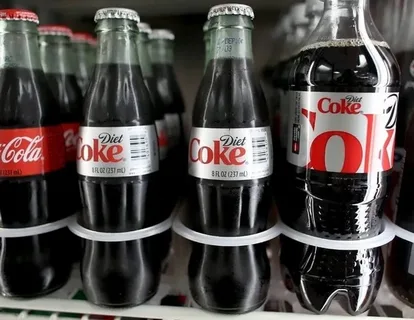Diet Coke has established itself as a commanding choice in the diet drink request, offering a zero- calorie volition to traditional mixers. Since its launch in 1982, Diet Coke has gained wide fashionability among those seeking to reduce their sweet input while still enjoying a stimulating, bouncy drink. This composition explores the origins, constituents, health considerations, and request presence of Diet Coke, furnishing a well- rounded perspective on this iconic drink.
What’s Diet Coke?
foreword and History
Diet Coke, also known as Diet Coca- Cola, was introduced by The Coca- Cola Company as a calorie-free option to its classic Coca- Cola.The launch of Diet Coke marked the company’s entry into the diet soda pop pop pop request, aiming to give a drink that retains the familiar taste of Coca- Cola without the calories. Since its commencement, Diet Coke has come a significant player in the soft drink assiduity, appealing to consumers looking for a low- calorie drink.
constituents and Sweeteners
Diet Coke’s distinctive taste comes from its use of artificial sweeteners, which replace sugar to give agreeableness without the added calories. The primary sweeteners used in Diet Coke are
Aspartame This low- calorie sweetener is roughly 200 times sweeter than sugar.It’s a common element in numerous diet mixers and contributes to the sweet flavor of Diet Coke.
Acesulfame Potassium( Ace- K) Another calorie-free sweetener, Ace- K is used in combination with aspartame to enhance the overall agreeableness and flavor profile of the drink.
These sweeteners allow Diet Coke to maintain its sweet taste while offering a zero- calorie option for consumers.
Health Considerations
Sweet and Sugar Content
One of the main lodestones of Diet Coke is its zero- calorie and zero- sugar profile. A standard 12- ounce can of Diet Coke contains no calories or sugars, making it an fascinating choice for those managing their weight or reducing their sugar input. still, while it eliminates sugar and calories, it does n’t contribute to quotidian nutritive conditions.
Artificial Sweeteners and Health
The use of artificial sweeteners in Diet Coke has been a content of ongoing debate. Regulatory agencies similar as the FDA have supposed aspartame and Ace- K safe for consumption, but some studies have raised enterprises about implicit long- term health goods. These enterprises include possible links to metabolic conditions, changes in gut microbiota, and increased jones for sweet foods. Despite these exchanges, the current agreement is that these sweeteners are safe for utmost people when consumed in temperance.
Hydration and Nutrition
Although Diet Coke offers a low- calorie option, it’s n’t a significant source of hydration or essential nutrients. Unlike potables similar as water, herbal teas, or natural fruit authorities, Diet Coke does n’t give vitamins, minerals, or other health benefits. counting solely on diet mixers for hydration is n’t recommended; a balanced diet with a variety of nutrient-rich foods and potables is essential for overall health.
fashionability and Market Presence
Global Reach
Diet Coke has a robust global presence, available in multitudinous countries around the world. Its fashionability is attributed to its association with the Coca- Cola brand and its appeal to those seeking a calorie-free volition to regular soda pop pop pop. The drink is offered in colorful sizes and formats, including barrels, bottles, and root drinks, making it vastly accessible to consumers.
Variants and Flavors
To feed to different taste preferences, The Coca- Cola Company has introduced several variants and flavors of Diet Coke over the times. These include
Diet Coke with Lime Adds a stimulating lime flavor to the classic Diet Coke.
Diet Coke with Cherry Features a hint of cherry flavor for a sweet twist.
Diet Coke with Vanilla Offers a vanilla- invested interpretation of the classic drink.
These variations give consumers with fresh choices while maintaining the zero- calorie advantage of Diet Coke.
Alternatives to Diet Coke
Other Diet Tonics
Several other diet mixers are available, each offering its own flavor profile and expression. Notable druthers include Diet Pepsi, Sprite Zero, and Diet Dr Pepper. These options also feed to consumers looking for low- calorie, sugar-free potables but differ in taste and constituents.
Healthier Beverage Options
For those seeking druthers to diet mixers, consider potables that offer natural constituents and health benefits. Some healthier options include
Sparkling Water Provides a bouncy sensation without artificial sweeteners or calories.
Herbal Teas Offer colorful flavors and health benefits without added sugars.
Infused Water Adds natural flavors through fruits and gravies without spare calories.
These druthers can contribute to better hydration and overall health while reducing reliance on diet mixers.
Conclusion
Diet Coke remains a popular choice for those seeking a low- calorie, sugar-free drink. While it provides a sweet, stimulating volition to traditional mixers, it’s important to consider the implicit health goods of artificial sweeteners and to balance your drink choices with nutrient-rich options. Whether you enjoy Diet Coke sometimes or as part of your quotidian routine, being alive of your overall nutrition and hydration conditions is vital to maintaining a healthy life.

